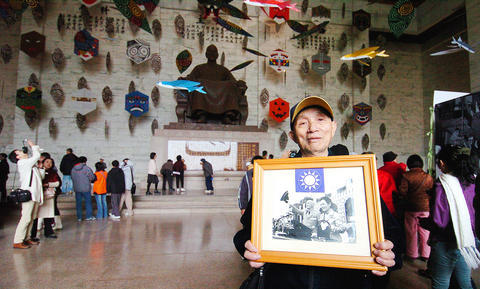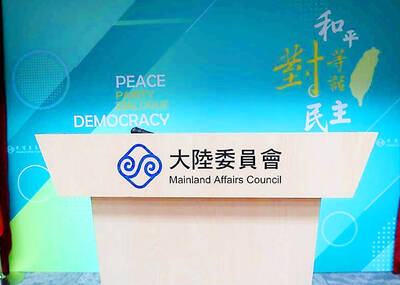National Taiwan Democracy Memorial Hall reopened to the public yesterday, with the 10m high statue of dictator Chiang Kai-shek (蔣介石) remaining in the lobby of the hall, which has been decorated with kites to reflect the theme of "a democratic wind."
Amid sporadic shouting outside the hall, President Chen Shui-bian (陳水扁) delivered the opening speech inside the heavily guarded building yesterday morning, saying that the name change of the hall and new inscription on the main arch signified that authoritarianism had ended and that an era of freedom and democracy had begun.
"Freedom and democracy have become part of our life, like the air we breathe each day," he said. "They do not come easily, however. Our ancestors fought for them, sacrificing their personal safety and even their lives."

PHOTO: GEORGE TSORNG, TAIPEI TIMES
The renaming of the hall, which was carried out under the auspices of the Ministry of Education, met with strong opposition. The inscription on the gateway -- dazhong zhizheng (大中至正), referring to Chiang's "great neutrality and perfect uprightness" -- was subsequently replaced with "Liberty Square."
Chen said the name change and the two exhibitions that opened at the hall yesterday would remind people that democracy and liberty come at a price and that Taiwanese must cherish those hard-earned achievements.
Ahead of the opening yesterday, there had been speculation that the administration would dismantle the statue or cover it up. Chen said the government would do neither.
Chen said that since the Democratic Progressive Party (DPP) came to power in 2000, his administration had made every effort to remove relics of authoritarianism.
During his term as Taipei mayor, Chen said, he changed Chiehshou Road's (介壽路) name to Ketagalan Boulevard to demonstrate his goodwill toward Aborigines and renamed Taipei New Park to 228 Peace Park -- in commemoration of the government crackdown on the civilian uprising that became known as the "228 Incident."
During his presidency, Chen replaced a sign that had hung over the entrance to the Presidential Office since 1948 -- Chiehshou Hall (介壽館) -- with a new sign that simply read "Presidential Office."
Chen said the reopening of the hall symbolized the "opening of the door of democracy" and that it transformed "a temple" worshipping a dictator to a venue where all people can freely reflect and learn the true meaning of democracy and human rights.
"We believe history will speak for itself and people will learn from history," he said. "That is the true meaning of the reopening."
Ministry of Education Secretary-General Chuang Kuo-jung (莊國榮), who had floated the idea of covering up the statue, yesterday said that it was one of the many options the ministry had considered.
The main hall, where the statue stands, is decorated with kites and large posters featuring themes from the nation's democratic movement.
The kites represent achieving freedom, Chuang said, like a butterfly that emerges from its cocoon.
He said the decorations cost about NT$1 million (US$31,000), substantially less than the price of the statue -- NT$23 million -- and the building itself -- NT$1.2 billion.
Asked about Vice President Annette Lu's (
Tu asked reporters attending the opening ceremony to decide for themselves whether the changes to the hall were worthy of praise or not.
"The way various media outlets report on today's event will be an indication of the development of media freedom and neutrality in the 20 years since the lifting of martial law," he said.
At an election rally event on Saturday in Jhonghe (
Chueh Feng-shih (闕豐實), a 67-year-old Taipei resident invited by the organizers to attend the ceremony, said he felt sad when he saw the names of all the victims of the 228 Incident posted on the wall.
He did not think the statue of Chiang should be removed. The statue can serve as a reminder to the public of the atrocities that Chiang committed during his rule, Chueh said.
Another guest, who identified herself only as Mrs Chen, agreed, saying that it was only right to educate the public both about the dictator's crimes and his contributions.
Her husband, Mr Su, however, said the statue should be melted, made into a missile and used against China.
Additional reporting by Jenny W. Hsu

NO RECIPROCITY: Taipei has called for cross-strait group travel to resume fully, but Beijing is only allowing people from its Fujian Province to travel to Matsu, the MAC said The Mainland Affairs Council (MAC) yesterday criticized an announcement by the Chinese Ministry of Culture and Tourism that it would lift a travel ban to Taiwan only for residents of China’s Fujian Province, saying that the policy does not meet the principles of reciprocity and openness. Chinese Deputy Minister of Culture and Tourism Rao Quan (饒權) yesterday morning told a delegation of Chinese Nationalist Party (KMT) lawmakers in a meeting in Beijing that the ministry would first allow Fujian residents to visit Lienchiang County (Matsu), adding that they would be able to travel to Taiwan proper directly once express ferry

STUMPED: KMT and TPP lawmakers approved a resolution to suspend the rate hike, which the government said was unavoidable in view of rising global energy costs The Ministry of Economic Affairs yesterday said it has a mandate to raise electricity prices as planned after the legislature passed a non-binding resolution along partisan lines to freeze rates. Chinese Nationalist Party (KMT) lawmakers proposed the resolution to suspend the price hike, which passed by a 59-50 vote. The Taiwan People’s Party (TPP) voted with the KMT. Legislative Speaker Han Kuo-yu (韓國瑜) of the KMT said the resolution is a mandate for the “immediate suspension of electricity price hikes” and for the Executive Yuan to review its energy policy and propose supplementary measures. A government-organized electricity price evaluation board in March

FAST RELEASE: The council lauded the developer for completing model testing in only four days and releasing a commercial version for use by academia and industry The National Science and Technology Council (NSTC) yesterday released the latest artificial intelligence (AI) language model in traditional Chinese embedded with Taiwanese cultural values. The council launched the Trustworthy AI Dialogue Engine (TAIDE) program in April last year to develop and train traditional Chinese-language models based on LLaMA, the open-source AI language model released by Meta. The program aims to tackle the information bias that is often present in international large-scale language models and take Taiwanese culture and values into consideration, it said. Llama 3-TAIDE-LX-8B-Chat-Alpha1, released yesterday, is the latest large language model in traditional Chinese. It was trained based on Meta’s Llama-3-8B

NOVEL METHODS: The PLA has adopted new approaches and recently conducted three combat readiness drills at night which included aircraft and ships, an official said Taiwan is monitoring China’s People’s Liberation Army (PLA) exercises for changes in their size or pattern as the nation prepares for president-elect William Lai’s (賴清德) inauguration on May 20, National Security Bureau (NSB) Director-General Tsai Ming-yen (蔡明彥) said yesterday. Tsai made the comment at a meeting of the Legislative Yuan’s Foreign Affairs and National Defense Committee, in response to Democratic Progressive Party (DPP) Legislator Wang Ting-yu’s (王定宇) questions. China continues to employ a carrot-and-stick approach, in which it applies pressure with “gray zone” tactics, while attempting to entice Taiwanese with perks, Tsai said. These actions aim to help Beijing look like it has